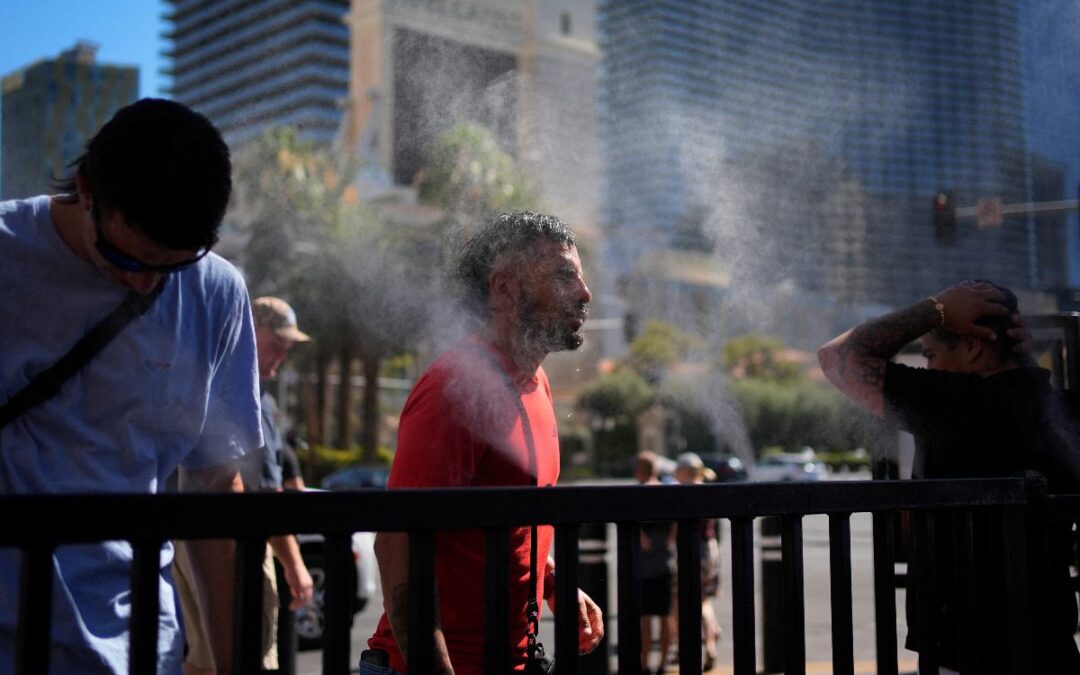
The Nevada Legislative Building in Carson City (Jeniffer Solis/Nevada Current)
By April Corbin Girnus, Nevada Current
Nevada’s Economic Forum adjusted the tax revenue forecast down $191 million for the upcoming biennium, representing a further dimming of an already dreary outlook of how the economy will fare under the Trump administration.
The revision means the Nevada State Legislature will have even tougher decisions to make in the upcoming month as they work toward passing a balanced biennium budget by June 2.
“The primary cause” of the lowered expectations from the economy “is the global trade war,” Moody’s economist Emily Mandel told the five-member panel of private-sector financial analysts tasked with setting the revenue forecast used for the state budget. Specifically, higher tariffs and the uncertainty that comes with rapid changes in policy “will do real damage to the economy.”
Moody’s is predicting the economy will experience a “sharp reduction in growth” that will “technically avoid a recession” but “will be felt by households and businesses,” said Mandel.
She acknowledged their forecast of dodging a recession assumes there will be a pivot in the Trump administration’s trade policies, either because Trump will reach trade deals with scores of nations or he will scale back tariffs that are upending the U.S and global economy. Absent a scaling back, the economic outlook will worsen.
Trump’s pivot on trade policy would need to happen “within the next few months,” she added.
Mandel’s comments to Nevada echoed what economists have said at the national and international level.
“The economy is on the precipice of going into recession, and will likely go into one, unless policy takes a very sharp turn here pretty quickly,” Moody’s Chief Economist Mark Zandi was quoted as saying last week.
Consumer spending makes up two-thirds of the economy, and eroding consumer confidence can be a sign of a recession.
“In the past, we’ve seen that when we get a 20-point reduction over three months” in the consumer confidence index “a recession will follow within 6 months,” Mandel said. “We’re currently at 19.3%. So we’re not there yet. But it’s a reason, just one of the reasons, we have a weaker forecast.”
Nevada numbers
The Nevada State General Fund budget for the upcoming biennium will now be set at $12.2 billion after tax credits. That’s $203 million more than what the current biennium is set to end at.
The Economic Forum’s $191 million reduction to the revenue forecast was largely a result of lowered expectations of sales and use tax. They now expect the general fund’s portion of sales tax to bring in $3.68 billion over the biennium — a $100 million drop from what was projected in December.
Moody’s is forecasting sales tax revenue to rise compared to the current biennium but only because the prices consumers pay will increase with inflation. They expect the volume of goods being sold to remain flat.
Notably, the forum chose not to adjust Nevada’s gaming revenue for the upcoming biennium, despite concerns about tourism softening.
The most recent data from the Gaming Control Board appears to show the state struggling to maintain previous levels of gaming win. But the decreases have been minor, said Shelley Newell, senior economist for the Nevada Gaming Control Board.
“With the information and data we have, we had discussions with our licensees,” she said. “They are very aware and cognizant of their numbers, and they do what it takes because they want to be successful in their business. They want the patrons in their establishments.”
Moody’s forecasted a sharp 8% decline in gaming for the upcoming fiscal year. When asked about that prediction by a forum member, Mandel stood by it.
“It sounds like a lot is being baked in, a lot of negative possibilities are being baked in,” commented Economic Forum Chair Linda Rosenthal while asking about the economic assumptions Mandel made to get to that number.
“We’re expecting a decline. I don’t know that I would call it dire relative to the realm of possibilities,” Mandel said, adding that she considered how gaming revenue performed during past, non-pandemic recessions.
The Las Vegas Convention and Visitors Authority has acknowledged that international tourism has dipped.
Canadians make up 10 to 13% of total visitors to Las Vegas, depending on who’s estimating. David Schmidt, an economist with the Nevada Department of Employment, Training and Rehabilitation (DETR), cited an analysis from UNLV’s Center for Business and Economic Research that found Canadian tourism supports more Las Vegas jobs (43,200) than manufacturing (33,700) does.
Mauricio Solorio, an economist within the Governor’s Finance Office, noted his forecast assumes the drop in tourism from Canada and Mexico could be partially offset by increased tourism from Europeans taking advantage of what’s expected to be a weaker American dollar.
Several European nations and Canada have issued travel advisories warning their citizens of the risks of getting caught up in Trump’s ramped up immigration enforcement policies.
The Economic Forum also chose to lower expectations for the state’s modified business tax (MBT) by $56.51 million. Economists attributed the expected drop in MBT to businesses scaling back expansion plans because of intense uncertainty accompanying Trump administration policies.
“Obviously, the outlook has deteriorated,” said Haley Owens, an economist with the Legislative Counsel Bureau. “We don’t expect to lose jobs in this forecast, but we have lowered our growth expectations both for jobs and wages.”
Mining tax revenue was adjusted upward by $1.23 million. Gold, by far the most valuable mineral mined in Nevada, is a safe haven investment that tends to increase substantially in price during economic crises.
Mining was one of three revenue streams adjusted upward. The others were the state’s insurance premium tax and real property transfer tax.
The forum bumped up insurance premium revenue stream by $46.29 million over the biennium. That helped offset some of the downward revisions elsewhere, but it will likely come at the cost of higher premiums paid by Nevadans for auto and home insurance.
The real property transfer tax was adjusted up by $6.86 million.
Democrats, Lombardo respond
Republican Gov. Joe Lombardo’s office in a statement called the reductions made by the Economic Forum “manageable.”
“While many fiscal decisions remain during the Legislative Session, the State will be able to mitigate and balance the updated revenue projections,” read the statement.
Meanwhile, Democrats were quick to emphasize that the reduction in expected revenue is a direct result of policies put in place by the Trump administration.
Senate Majority Leader Nicole Cannizzaro, in a press gaggle after the forum, said the Legislature will now be “maintaining as much as we can with what we have.”
“I think the focus for us now is to make sure that we are keeping intact the services and programs that we have,” she said. “To continue to provide healthcare for working families, to continue to provide education to children. Those are going to be at the forefront of everyone’s minds.”
Cannizzaro acknowledged that additional financial uncertainty looms. The Economic Forum’s projection only covers the state’s general fund revenue, which lawmakers generally get to decide how to spend.
The State Education Fund, which funds Nevada’s K-12 public schools, is a separate pot of money funded by the Local Schools Support Tax (LSST), part of the statewide sales tax rate. The LSST rate (2.6%) is higher than general fund sales tax rate (2%), meaning the State Education Fund will likely be looking at its own decline of at least $100 million — likely more since it is also funded by the general fund and other revenue streams that might be impacted by a weakening economy.
Cannizzaro said the forecast for the State Education Fund is expected to be finalized in the next week.
Also still looming over Nevada is the threat of Congress slashing federal funding for widely used programs like Medicaid. If that happens, states will be forced to either cut services or find additional revenue to continue funding services at current levels.
The likelihood of Nevada being able to backfill lost federal revenue is highly unlikely, she said. Cannizzaro did not rule out the possibility of tapping the state’s Rainy Day Fund, formally known as the Account to Stabilize the Operation of the State Government. Lombardo’s office also mentioned the fund in its statement, which similarly acknowledged the potential for future revenue shortfalls.
“Should any unexpected budget issues arise later in the upcoming biennium, Nevadans can rest assured that the State is well-prepared to navigate moments of fiscal uncertainty, especially with the record amount of money in the Rainy Day Fund under Governor Lombardo’s leadership,” read the statement.
Transfer amounts to Nevada’s Rainy Day Fund are set and required by state law: 1% of anticipated revenue each fiscal year, as well as a portion of excess general fund collections.
However, Lombardo last session did successfully spearhead an effort to raise the Rainy Day Fund cap from 20% to 26% of appropriations from the state general fund.
In September 2024, Lombardo and State Treasurer Zach Conine announced the Rainy Day Fund had reached an all-time high of $1.24 billion.
Nevada also has additional reserve funds housed in the Education Stabilization Account, a separate rainy day fund for education set up in 2019.
Mayday
The Economic Forum is statutorily required to meet in December of even-numbered years to approve a revenue forecast. That forecast is used as the base for the governor’s recommended budget, which is given to the Legislature for consideration.
The forum is required to meet again on or before May 1 of odd-numbered years to reconsider their forecast and make adjustments. That forecast must be reflected in the balanced budget passed by the Legislature and signed by the governor by the final day of the legislative session.
Lawmakers are considering changing that timeline. Senate Bill 419, which is quietly making its way through the Legislature, proposes changing the date for reconsidering the forecast to April 1.
In a hearing for the bill, Democratic state Sen. Marilyn Dondero Loop noted the current May 1 deadline predates the state’s 120-day session cap, which was put in place via a constitutional amendment in 1998. Moving the date would give the leg more time to adjust budget accordingly.
Editor’s Note: This article has been updated with additional information on the budget.
Nevada Current is part of States Newsroom, a nonprofit news network supported by grants and a coalition of donors as a 501c(3) public charity. Nevada Current maintains editorial independence. Contact Editor Hugh Jackson for questions: info@nevadacurrent.com.

Bill seeks to ensure full refunds when utilities overcharge customers
By Jeniffer Solis, Nevada Current Lawmakers are looking to pass a law that would require utilities to fully refund energy customers who are...

Proyecto de ley requeriría mejor protecciones del calor extremo en algunas ciudades de Nevada
Cinco ciudades de Nevada pronto podrían verse obligadas a tomar más medidas para ayudar a proteger a los residentes del calor extremo. Si el...

USDA cancels funding for popular locally grown food programs in Nevada
By Jeniffer Solis - Nevada Current The U.S. Department of Agriculture has axed two programs that gave Nevada schools and food banks more than $6...

State bill would allow immigrant parents to designate legal guardians for kids if they’re deported
Assembly Bill 460 would create a legal process that authorizes a parent or guardian to pre-designate another person to act as a child’s primary...

Do you care about IVF access in Nevada? These senators have a plan to protect it.
A group of Nevada Democrats wants to protect in vitro fertilization (IVF) in the state—and they want to make it more accessible for people to get....

Bill to suspend egg regulations sails through Nevada legislature, awaits Lombardo’s signature
While the bill seeks to allow officials to temporarily suspend the state’s prohibition on non-cage-free eggs, one expert told The Nevadan it may...




